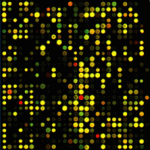Genomics
|
25 november 2015 13:35:19 |
| Comprehensive characterization of a time-course transcriptional response induced by autotoxins in Panax ginseng using RNA-Seq (BMC Genomics) |
|
Tweet Background:
As a valuable medicinal plant, the yield of Panax ginseng is seriously affected by autotoxicity, which is a common phenomenon due to continuous cropping. However, the mechanism of autotoxicity in P. ginseng is still unknown.
Results:
In total, high throughput sequencing of 18 RNA-Seq libraries produced 996,000 000 100-nt reads that were assembled into 72,732 contigs. Compared with control, 3697 and 2828 genes were significantly up- and down-regulated across different tissues and time points, respectively. Gene Ontology enrichment analysis showed that ‘enzyme inhibitor activity’, ‘carboxylesterase activity’, ‘pectinesterase activity’, ‘centrosome cycle and duplication’ and ‘mitotic spindle elongation’ were enriched for the up-regulated genes. Transcription factors including AP2s/ERFs, MYBs, and WRKYs were up-regulated in roots after benzoic acid treatment. Moreover, reactive oxygen species, peroxidases and superoxide dismutase contigs were up-regulated in roots after benzoic acid treatment. Physiological and biochemical indexes showed that the proline and malondialdehyde content were restored to lower levels at a later stage after benzoic acid treatment. Benzoic acid inhibited the root hair development in a dose-dependent manner, and several differential expressed genes potentially involved in hair development were identified. Several key contigs in the flavonoid and ginsenoside biosynthesis pathways were repressed. Finally, 58,518 alternative splicing (AS) events from 12,950 genes were found after benzoic acid treatment. Interestingly, contigs in the ginsenoside biosynthetic pathway underwent AS, providing useful information about post-transcriptional regulation in P. ginseng.
Conclusions:
This study revealed the stress-response molecular mechanisms in P. ginseng induced by benzoic acid. |
| 117 viewsCategory: Genomics |
 Whole genome annotation and comparative genomic analyses of bio-control fungus Purpureocillium lilacinum (BMC Genomics) Whole genome annotation and comparative genomic analyses of bio-control fungus Purpureocillium lilacinum (BMC Genomics)A Bayesian model for detection of high-order interactions among genetic variants in genome-wide association studies (BMC Genomics) 
|
| blog comments powered by Disqus |
MyJournals.org
The latest issues of all your favorite science journals on one page
The latest issues of all your favorite science journals on one page



